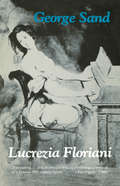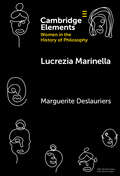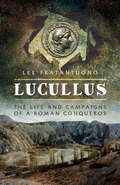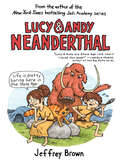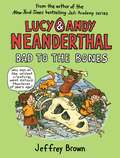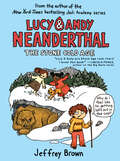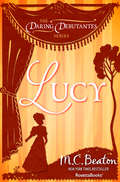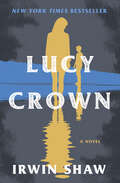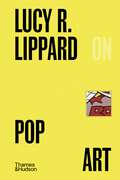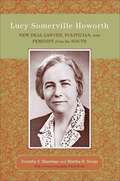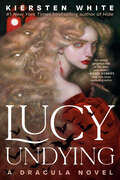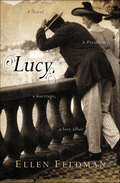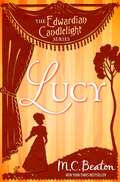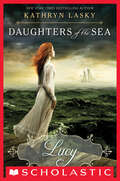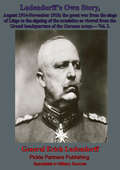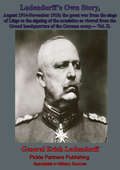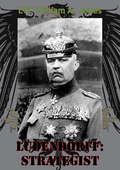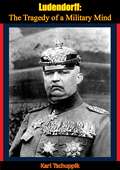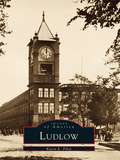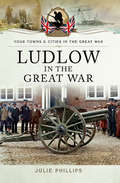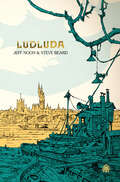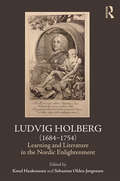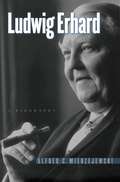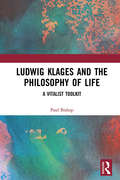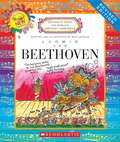- Table View
- List View
Lucrezia Floriani
by George Sand Julius EkerLucrezia Floriani, a worldly 30-year-old actress and the mother of 4 children with 3 different fathers, meets and falls in love with Prince Karol, a moody, introspective aristocrat.
Lucrezia Marinella (Elements on Women in the History of Philosophy)
by Marguerite DeslauriersLucrezia Marinella's (1571–1653) most important contributions to philosophy were two polemical treatises: The Nobility and excellence of Women, and the Defects and Vices of Men, and the Exhortations to Women and to Others if They Please. Marinella argues for the superiority of women over men in every respect: psychologically, physiologically, morally, and intellectually. She is particularly effective in using the resources of ancient philosophy to support her various arguments, in which she draws conclusions about the souls and the bodies of women, the nature and significance of women's beauty, the virtue of women and the liberty to which women as well as men are entitled. This Element showcases that her claim of superiority is intended ultimately to justify the possibility of political rule by women.
Lucullus: The Life and Campaigns of a Roman Conqueror
by Lee FratantuonoThe military achievements of Lucius Licinius Lucullus (118-57/56 B.C.) have been the subject of admiration and great respect throughout the history of the study of warfare. Yet there have been few studies dedicated to a comprehensive examination of exactly how Lucullus conquered the Roman East and made it a more or less cohesive part of the empire. Lee Frantantuono considers every aspect of Lucullus life, starting with the training and education of a future Roman officer, but the greatest emphasis is on his military strategy and tactics during the Third Mithridatic War and his military adventures in Armenia. His most famous achievement was his victory against immense odds at the land battle of Tigranocerta. We are also reminded that he one of the most formidable naval strategists of the Roman Republic. Lucullus complicated relationship with Sulla and Crassus is explored and the study concludes with the retirement of the man Pliny the Elder memorably referred to as 'Xerxes in a Toga', a patron of the arts and master of a life of horticulture and reflection.
Lucy & Andy Neanderthal (Lucy and Andy Neanderthal #1)
by Jeffrey BrownFrom the author of the New York Times bestselling Jedi Academy books comes a hilarious graphic novel series about two young cave kids living 40,000 years ago.&“Lucy & Andy are Stone Age rock stars! I loved this book!&” —Lincoln Peirce, author of the Big Nate series Lucy and Andy are a sister and brother who get into trouble much like any sister and brother. Only difference? Lucy and Andy live in the Stone Age! Discover their laugh-out-loud adventures as the Paleo pair take on a wandering baby sibling, bossy teens, cave paintings, and a mammoth hunt. But what will happen when they encounter a group of humans?Includes extra information about Neanderthal life that's sure to appeal to future paleontologists and science phobes alike! And don't miss Lucy and Andy's next outing, Lucy & Andy Neanderthal: The Stone Cold Age -- coming soon!A New York City Public Library Best 50 Books for Kids 2016!A Chicago Public Library Best of the Best 2016!"Jeffrey Brown returns from a galaxy far, far away to bring us a whole new slew of kid-friendly characters! Just beware of mammoth dung!" —Keith Knight, author of Jake the Fake and The Knight Life Every kid will love to go back in time with LUCY & ANDY!" —Judd Winick, author of Hilo: The Boy Who Saved the World
Lucy & Andy Neanderthal: Bad to the Bones (Lucy and Andy Neanderthal #3)
by Jeffrey BrownFrom the author of the New York Times bestselling Jedi Academy books comes book three in the laugh-out-loud graphic novel series about cave kid siblings Lucy and Andy. Fans of Big Nate, Diary of a Wimpy Kid, and The Terrible Two won't want to miss it!"Lucy & Andy are Stone Age rock stars! I loved this book!" -LINCOLN PEIRCE, author of the BIG NATE series Lucy and Andy have some extra space in the cave now the humans have moved out. But they do miss hanging with Sasha and Tommy. Luckily, their new friends live right around the ice block, close enough to form the first-ever explorer's club! These adventurers are on the hunt. Their first big discovery: dinosaur bones!Jeffrey Brown masterfully blends facts with funny in this graphic novel series. Includes theories about how Neanderthals went extinct; a timeline covering the history of Earth, dinosaurs, Neanderthals, and present day; museums, caves, and paleontologists of note; and Neanderthal Fact vs. Fiction."Lucy & Andy are Stone Age rock stars! I loved this book!" --Lincoln Peirce, author of the Big Nate series"Every kid will love to go back in time with Lucy & Andy!" --Judd Winick, author of Hilo: The Boy Who Saved the World"Jeffrey Brown returns from a galaxy far, far away to bring us a whole new slew of kid-friendly characters!" --Keith Knight, author of Jake the Fake and The Knight Life
Lucy & Andy Neanderthal: The Stone Cold Age (Lucy and Andy Neanderthal #2)
by Jeffrey BrownFrom the author of the New York Times bestselling Jedi Academy books comes book two in the laugh-out-loud graphic novel series about Neanderthal siblings Lucy and Andy. Fans of Big Nate, Diary of a Wimpy Kid, and The Terrible Two won&’t want to miss it! &“Lucy & Andy are Stone Age rock stars! I loved this book!&” —Lincoln Peirce, author of the Big Nate series Neanderthal siblings Lucy and Andy are back to their paleo pranks. This time, they have to put up with more than just each other—the cave is feeling awfully cramped since the humans moved in. They&’re in the Ice Age, and legroom comes at a real premium! Jeffrey Brown skillfully blends humor and history with paleontologist sections: Timeline of Key Discoveries, Ice Age Fact vs. Fiction, Silly Cavemen Myths, and more. "A fast, funny read" –Kirkus Reviews
Lucy (The Daring Debutantes Series #4)
by M. C. BeatonTwo servants team up to fool London society in this Edwardian romance by the New York Times–bestselling author of the Agatha Raisin mysteries.She is a lady&’s maid who longs to be a lady. How else can Lucy Balfour hope to win the favor of Andrew, Viscount Harvey, the toast of the town, who seems ready to take a bride at last? There is only one way to command his attention. It seems an impossible dream. Even the first step is daunting: Lucy must become the peer of her own mistress, the coldly beautiful Lady Angela, who is also determined to claim Andrew as her own. But there is Hamish MacGregor, the wily old butler, who promises to make Lucy&’s dream come true. With Lucy&’s unaccountable good luck at baccarat, they can win a fortune. With his cunning, they may conquer London society as &“father&” and &“daughter&” and meet the king himself! Having served the rich, he knows how they operate, and Hamish MacGregor is determined to beat them at their own game. And having met Andrew Harvey, Lucy Balfour determines she will never be a servant again…ABOUT THE COLLECTION The seven heroines of the Daring Debutantes Collection set out to conquer London&’s glittering high society and the marriage mart. These headstrong women cannot help but keep London society dangling on a string, but will they find a husband or lose themselves in the game?
Lucy Crown: A Novel
by Irwin ShawA New York Times bestseller from an author with &“a natural gift for storytelling&”: A mother and son are reunited years after a shattering betrayal (The New York Times). She passes through the Paris restaurant, alone, unbent, and unbroken. Lucy Crown has lived with heartbreak for long enough that it no longer shows on her face, and she&’s not afraid to dine in solitude. But then she sees him across the bar, full of liquor and life, looking far happier than he did the last time she saw him two decades before: Tony, her son—the one man she loved more than any other, the one she nearly destroyed. Twenty years earlier, in 1937, Lucy was an unhappily married suburban housewife, and Tony was so frail his parents were forced to hire a companion for him. When the companion caught Lucy&’s eye, he awoke in her a feeling of passion she thought had died long ago—leading to an act of indiscretion during a vacation in Vermont that would upend their family, and take half a lifetime to repair. From the author of such classics as Rich Man, Poor Man and The Young Lions—an O. Henry Award winner who &“always writes immensely readable books&”—Lucy Crown is an unflinching look at the emotional reality of infidelity, heartbreak, and divorce that remains a testament to the power of forgiveness (The New York Times). This ebook features an illustrated biography of Irwin Shaw including rare images and never-before-seen documents from the author&’s estate.
Lucy R. Lippard on Pop Art (Pocket Perspectives #0)
by Lucy LippardExplore the dynamic world of 1960s pop art through Lucy Lippard's insightful analysis of this groundbreaking international art movement. Surprising, questioning, challenging, enriching: the Pocket Perspectives series presents timeless works by writers and thinkers who have shaped the conversation across the arts, visual culture, and history. Celebrating the undiminished vitality of their ideas today, these covetable and collectable little books embody the best of Thames & Hudson.
Lucy Somerville Howorth: New Deal Lawyer, Politician, and Feminist from the South (Southern Biography Series)
by Anne Firor Scott Dorothy S. Shawhan Martha H. SwainBorn, raised, and retired in Mississippi, Lucy Somerville Howorth (1895--1997) was a champion for the rights of women long before feminism emerged as a widely recognized movement. As told by Dorothy S. Shawhan and Martha H. Swain, hers is a remarkable life story-from a small-town upbringing to a career as an attorney, an activist, and the last of a generation of New Deal women in Washington, D.C. She held a presidential appointment under every chief executive from Franklin Roosevelt to John Kennedy.Howorth was a fervent believer in the power of organizations to bring about change, and she became known for her leadership qualities, acumen, and quick appraisal of social problems, particularly as they affected women. Shawhan and Swain point out that her winsome personality, small stature, and delightful sense of humor also aided her as a female aspiring in a man's world. In 1931 she was elected to the Mississippi House of Representatives and, after campaigning for Roosevelt, was rewarded by the new president with a federal appointment. She served in a number of subsequent roles, rising to become general counsel of the War Claims Commission, at that time the highest legal position in an executive commission ever filled by a woman.Howorth worked relentlessly for the advancement of women, especially through the American Association for University Women and the National Federation of Business and Professional Women. She lobbied for equality in the workplace, helping to effect significant advances in government and the professions. In 1944, at the request of Eleanor Roosevelt, Howorth delivered the keynote speech at the White House Conference on Women in Postwar Policy-Making, the most memorable of her many public addresses.This first-ever biography of Howorth bestows long-overdue recognition of her many notable achievements and illuminates the activism of women in the decades often considered to be the doldrums of the women's movement.
Lucy Undying: A Dracula Novel
by Kiersten WhiteA vampire escapes the thrall of Dracula and embarks on her own search for self-discovery and true love in this epic and seductive gothic fantasy from the #1 New York Times bestselling author of Hide.&“Fiercely empowering and gloriously vengeful.&”—Heather Walter, award-winning author of MaliceA CRIMEREADS BEST BOOK OF THE YEARHer name was written in the pages of someone else&’s story: Lucy Westenra was one of Dracula&’s first victims.But her death was only the beginning. Lucy rose from the grave a vampire and has spent her immortal life trying to escape from Dracula&’s clutches—and trying to discover who she really is and what she truly wants.Her undead life takes an unexpected turn in twenty-first-century London, when she meets another woman, Iris, who is also yearning to break free from her past. Iris&’s family has built a health empire based on a sinister secret, and they&’ll do anything to stay in power.Lucy has long believed she would never love again. Yet she finds herself compelled by the charming Iris while Iris is equally mesmerized by the confident and glamorous Lucy. But their intense connection and blossoming love is threatened by outside forces. Iris&’s mother won&’t let go of her without a fight, and Lucy&’s past still has fangs: Dracula is on the prowl once more.Lucy Westenra has been a tragically murdered teen, a lonesome adventurer, and a fearsome hunter, but happiness has always eluded her. Can she find the strength to destroy Dracula once and for all, or will her heart once again be her undoing?
Lucy: A Novel
by Ellen FeldmanAn utterly absorbing novel about a famous political marriage and an epic infidelity. On the eve of World War I, Assistant Secretary of the Navy Franklin Delano Roosevelt, fiercely ambitious and still untouched by polio, falls in love with his wife's social secretary, Lucy Mercer. Eleanor stumbles on their letters and divorce is discussed, but honor and ambition win out. Franklin promises he will never see Lucy again. But Franklin and Lucy do meet again, and again they fall in love. As he prepares to run for an unprecedented third term and lead America into war, Franklin turns to Lucy for the warmth and unconditional approval Eleanor is unable to give. Ellen Feldman brings a novelist's insight to bear on the connection of these three compelling characters. Franklin and Lucy did finally meet, across the divide of his illness and political ascendancy, her marriage and widowhood. They fell in love again. As he prepared to run for an unprecedented third term and lead America into war, Franklin turned to Lucy for the warmth and unconditional approval Eleanor was unable to give. Drawing on recently discovered materials to re-create the voice of a woman who played a crucial but silent role in the Roosevelt presidency, Lucy is a remarkably sensitive exploration of the private lives behind a public marriage. Reading group guide included.
Lucy: Edwardian Candlelight 12 (Edwardian Candlelight #12)
by M.C. BeatonThe twelfth book in M.C. Beaton's charming Edwardian Candlelight series.She was a lady's maid who longed to be a lady. How else could Lucy Balfour hope to win the favor of Andrew, Viscount Harvey, the toast of the town, who seemed ready to take a bride at last? There was only one way and that was to command his attention. It seemed an impossible dream; first she had to become the peer of her own mistress, the coldly beautiful Lady Angela, who was determined to claim Andrew as her own.But there was Hamish MacGregor, the wily old butler, who promised to make Lucy's dream come true. With Lucy's unaccountable good luck at baccarat, they could win a fortune. With his cunning, they would conquer London society as "father" and "daughter" and meet the king himself! Having served the rich, he knew how they operated and Hamish MacGregor was determined to beat them at their own game. And having met Andrew Harvey, Lucy Balfour determined she would never be a servant again.The Edwardian Candlelight Series chronicles young, passionate girls who come to understand the nature of true love despite overwhelming odds. From a penniless pauper, a stenographer, a governess to an accused murderess, these ladies in love overcome incredible odds with grit and sophistication to find and keep true love.
Lucy: Lucy (Daughters Of The Sea #3)
by Kathryn LaskyA choice between love and survival . . .Lucy's family is excited to spend the summer in Bar Harbor, Maine. Her minister father is pleased to preside over such a prestigious congregation, and his social-climbing wife is ecstatic at the chance to find a rich husband for her daughter. Yet Lucy wants nothing to do with the Bar Harbor social scene; she's simply excited to spend the summer by the sea, watching the waves from her favorite spot on the cliff. Despite having never gone swimming, Lucy feels an intense connection to the ocean, and meets a handsome ship-builder who shows Lucy a world she's never known, yet somehow always longed for. However, her mother will stop at nothing to keep Lucy and the ship builder apart, even if it means throwing Lucy into the arms of a wealthy man with a dangerous secret. Can Lucy break free and embrace her destiny as a daughter of the sea? Or is she doomed to waste away in a gilded cage, slowly dying of a broken heart?
Ludendorff's Own Story, August 1914-November 1918 The Great War - Vol. I: from the siege of Liège to the signing of the armistice as viewed from the Grand headquarters of the German army (Ludendorff's Own Story #1)
by Anon Anon General Erich Friedrich Wilhelm LudendorffAs the German army moved swiftly into its start positions at the beginning of the First World War, efficiently and seamlessly forming up for the hammer blow that was to fall on France it must have been with some pride that General Ludendorff would look upon the first grand strategical plan that he had a hand in. A cool, calculating planner dedicated to ensuring that chance played as little a part in war as possible General Erich Ludendorff was the product of the prestigious German Kriegsakademie. His memoirs on the First World War are an excellently detailed account of the planning and execution of the ambitious German High command and their thirst for VictoryAlthough known primarily as staff officer his initial service, in the German army, during the war, was at the siege of Liège for which he was awarded the coveted Pour La Mérite by the Kaiser himself. He was rushed to the embattled Eastern Front as Chief of Staff to General von Hindenburg, and the two made an impressive team winning that battles of Tanneburg and the Masurian Lakes. Once again Ludendorff, this time was his chief Hindenburg, was drafted in as a replacement to ensure the fortunes of the German forces, this time on the Western front in 1916. He operated as the prime mover in the German empire from this point until the end of the war; masterminding the 1918 offensives as the last throw of the dice before capitulation.This first volume covers his early career until 1917 and is enriched with maps of the campaigns of the First World War.Author -- General Erich Friedrich Wilhelm Ludendorff, 1865-1937.Translator -- Anon.Text taken, whole and complete, from the edition published in New York and London, Harper & Brothers, 1919.Original Page Count - 477 pages
Ludendorff's Own Story, August 1914-November 1918 The Great War - Vol. II: from the siege of Liège to the signing of the armistice as viewed from the Grand headquarters of the German army (Ludendorff's Own Story #2)
by Anon Anon General Erich Friedrich Wilhelm LudendorffAs the German army moved swiftly into its start positions at the beginning of the First World War, efficiently and seamlessly forming up for the hammer blow that was to fall on France it must have been with some pride that General Ludendorff would look upon the first grand strategical plan that he had a hand in. A cool, calculating planner dedicated to ensuring that chance played as little a part in war as possible General Erich Ludendorff was the product of the prestigious German Kriegsakademie. His memoirs on the First World War are an excellently detailed account of the planning and execution of the ambitious German High command and their thirst for VictoryAlthough known primarily as staff officer his initial service, in the German army, during the war, was at the siege of Liège for which he was awarded the coveted Pour La Mérite by the Kaiser himself. He was rushed to the embattled Eastern Front as Chief of Staff to General von Hindenburg, and the two made an impressive team winning that battles of Tanneburg and the Masurian Lakes. Once again Ludendorff, this time was his chief Hindenburg, was drafted in as a replacement to ensure the fortunes of the German forces, this time on the Western front in 1916. He operated as the prime mover in the German empire from this point until the end of the war; masterminding the 1918 offensives as the last throw of the dice before capitulation.This second volume covers from 1917 until the end of the War and is enriched with maps of the campaigns of the First World War.Author -- General Ludendorff, Erich Friedrich Wilhelm, 1865-1937.Translator -- Anon.Text taken, whole and complete, from the edition published in New York and London, Harper & Brothers, 1919.Original Page Count - 473 pages
Ludendorff: Strategist
by LTC William A. JonesOne of the techniques to understanding the successful choreography of the elements of strategy is the study of the great strategists of history. This worthy endeavor, however, should not be limited to the study of success. Many significant lessons concerning the components of strategy can only be derived from studying the examples of great strategic failure. Erich Ludendorff failed as a strategic leader. This case study traces the genesis of his failure in the context of his inability to properly coordinate the elements of strategy. It is an analysis of the process which led to his failure. An appreciation of his background and heritage reveals the nature of his values and prejudices which accompanied him to the strategic level. An analysis of his strategic development links his character with his personal experiences at the different levels of leadership. Finally an essay of his work as a strategic leader is diagrammed in terms of his character, his development and the strategic environment of the times. Collectively, this diversified group of inputs, some complimentary, others often in direct competition, serve to identify the base from which his strategic decisions were made. The value of this study becomes apparent as the errors suddenly become glaring and the student finds himself learning from the strategic solution that in fact led to failure.
Ludendorff: The Tragedy of a Military Mind
by Karl Tschuppik W. H. JohnstonSome historians postulate that the First World War would have ended several months earlier if it were not for the successful strategy and deception employed by German President Paul von Hindenburg (1847-1934) and General Erich Ludendorff (1865-1937) of the German High Command.It is believed that both Hindenburg and Ludendorff realized as early as 8 August 1918 that victory was not possible; however, neither could conceive of accepting defeat. Therefore, in late September 1918, a carefully planned ‘revolution from above’ resulted in the High Command being placed under government control which gave Hindenburg and Ludendorff the opportunity to shift the responsibility of seeking an armistice and military defeat from the High Command to the civilian government and the Reichstag.First published in its English translation in 1932, this book by Austrian writer and journalist Karl Tschuppik is an analysis of Erich Ludendorff. The author demonstrates the power the High Command had over the Chancellor and Kaiser, and the book provides a useful in understanding the High Command’s power and for obtaining quotations regarding the High Command’s power.
Ludlow (Images of America)
by Karen E. PilonIncorporated on February 28, 1774, Ludlow, Massachusetts, was originally a part of Springfield. The origin of the name remains a mystery, though the most probable explanation is that it was named afterRoger Ludlow, an early prominent New England citizen who played a great part in building up the town and taking care of its citizens. The Ludlow Manufacturing Company, formed around 1900 by Charles T. Hubbard, helped shape the town by providing housing, a library, schools, playgrounds, and even a clubhouse for the diverse community. Ludlow was home to many sawmills and gristmills, utilizing the power from the several sources of water nearby, including the Chicopee River, Broad Brook, Higher Brook, and Stony Brook. The town is most noted, however, for its factory mills and production of jute yarns, twine, and webbing. Less well known was the glass-making business that was prevalent in the early 1800s. John Sikes manufactured glass bottles andother glassware and the Ludlow Manufacturing Company glass works operated for only a short time before closing in the depression years following the War of 1812. Today, Ludlow remains a culturally diversecommunity made up of Portuguese, Polish, French, and Irish residents, just to name a few.
Ludlow in the Great War (Your Towns & Cities in the Great War)
by Julie PhillipsWars affect everyone. Whether they are fought on the battlefields or on the home front, by the armed forces or civilians, sacrifices have to be made, and everyone suffers one way or another. This book gives a flavour of what it was like to live in Ludlow through the Great War years. Ludlow was proud to send its brothers, husbands, uncles and fathers to fight for King and Country, many of whom had never been far from home before, some who came from decorated service backgrounds for whom the armed services was in their blood. Rich or poor, farm worker, office manager or son of a wealthy estate owner, they all united to defend their town and protect British values and way of life. Life continued as usual for many of those on the home front despite, amongst other things, the introduction of DORA, rationing and the loss of the labour force from the farms. Ludlow was already generous in its giving to the poor but this was taken to a whole new level with the introduction of many national and local war charities. They knitted, sewed, auctioned and sung their way through the war even a patriotic donkey called Willie and a pig did their bit by being auctioned several times to raise money for the war effort.This show of patriotism and stoicism was made against the backdrop of a bloody and heinous war that went on far longer than anticipated. The constant threat of receiving the dreaded telegram indicating their loved ones fate was never far from the minds of Ludlow's civilians, yet the people of Ludlow kept the home fires burning brightly.
Ludluda: The Second Chronicle of Ludwich
by Jeff Noon Steve BeardConcluding the epic two-book series from the highly celebrated and award-winning authors Jeff Noon and Steve Beard.Ludluda, the sequel to Gogmagog, takes us on a haunting and delightfully witty adventure in a fantasy world which defies genre.Luluda tells the story of a journey through a strange modern city whose power is sourced from the ghost of a dragon. Ludwich may no longer be at war with its great political rival overseas, but veteran sailor Cady Meade, survivor of many battles, suspects that the hard-won peace is about to break. She promises to deliver a preternatural ten-year old girl to a coming-of-age festival in the heart of Ludwich. But she has been warned by the prophets that dangers lie ahead.Cady suspects that the young girl&’s fate is entwined with that of the city. When the girl disappears, the old sailor must hunt her down, accompanied by a know-it-all mechanical man whose circuits are slowly grinding to dust. But Cady&’s mission has always been to guard Ludwich from enemies both known and occult, and she will never give up.Following the course of the River Nysis through the city, and beyond, Cady must uncover the final mysteries of the great dragon Haakenur's life and death and afterlife. Her greatest battle is about to begin.
Ludvig Holberg (1684-1754): Learning and Literature in the Nordic Enlightenment
by Knud Haakonssen Sebastian Olden-JørgensenLudvig Holberg (1684–1754) was the foremost representative of the Danish-Norwegian Enlightenment and also a European figure of note. He published significant works in natural law and history, but also a very important body of moral essays and epistles. He authored several engaging autobiographies and European travelogues, a major utopian novel that was an immediate European succes, interesting satires that advocated women’s education and career, and a large number of comedies. These comedies secured Holberg’s status as the most significant playwright in Scandinavia before Ibsen and Strindberg. Through his extensive oeuvre, but especially through his plays, Holberg had a decisive influence on the formation of modern Danish as a literary language, something that was a self-conscious effort on the part of a man who saw himself as an educator of the public. Despite his contemporary impact at home and abroad and his ongoing popularity in Scandinavia, he remains little known in the wider world of enlightenment studies. It is the aim of this volume to revive Holberg as a major figure from a minor corner of the Enlightenment world by presenting the full variety of his work and giving it a European context.
Ludwig Erhard
by Alfred C. MierzejewskiIn the first English-language biography of one of the most important figures in postwar German history, Alfred C. Mierzejewski examines the life and service of Ludwig Erhard (1897-1977), West Germany's first minister of economics and second chancellor. Erhard liberalized the German economy in 1948 and is generally considered the father of West Germany's "economic miracle--the period of extraordinary growth in jobs and improvement in the standard of living in the 1950s that helped stabilize Germany's first successful democracy. While recent scholarship has dismissed Erhard's influence on Germany's economic recovery, Mierzejewski returns to little-cited German analyses and Erhard's own record and concludes that Allied currency reform and Erhard's liberalization of the economy were crucial triggers for Germany's unprecedented economic boom. Mierzejewski provides insight into Erhard's policies, his ideas, his character, and his relationships with Konrad Adenauer and Charles de Gaulle. By offering a fresh account of Erhard's career as a leader in postwar West Germany, Mierzejewski provides a deeper understanding of Germany's economy as well as its democracy.
Ludwig Klages and the Philosophy of Life: A Vitalist Toolkit
by Paul BishopThis book provides a unique overview of and introduction to the work of the German psychologist and philosopher Ludwig Klages (1872-1956), an astonishing figure in the history of German ideas. Central to intellectual life in turn-of-the-century Munich, he went on to establish a reputation for himself as an original and provocative thinker. Nowadays he is often overlooked, partly because of the absence of an accessible and authoritative introduction to his thought; this volume offers just such a point of entry. With an emphasis on applicability and utility, Paul Bishop reinvigorates the discourse surrounding Klages, providing a neutral and compact account of his intellectual development and his impact on psychology and philosophy. Part 1 offers an overview of Klages’s life, visiting the major stations of his intellectual development. Part 2 examines in turn nine major conceptual ‘tools’ found in Klages’s extensive writings, aiming to clarify Klages’s terminology, to demystify his discourse, and to sift through Klages’s credentials as a psychological thinker. Part 3 consists of extracts from Klages’s writings, thematically oriented; these showcase the aphoristic and lyrical, as well as psychological and philosophical, qualities of Klages’s writing, including his interest in aesthetics. Taken together, all three parts constitute a vitalist ‘toolkit’ — to build a fuller, richer life. Drawing on previous studies of Klages that have only been available in German, Ludwig Klages and the Philosophy of Life provides a non-polemical account of Klages’s life and work, with explanations and commentaries to guide the reader through extracts from his writings. The book accessibly explains the most important ideas and concepts found in Klages’s work, including soul, spirit, character, expression, will, and consciousness, and it reveals Klages to be a serious figure whose thought remains relevant to many disciplines today. It will stimulate interest in his work and create a new readership for his remarkable worldview.
Ludwig Van Beethoven (Getting To Know The World's Greatest Composers)
by Mike VeneziaPresents a biography of Ludwig Van Beethhoven
